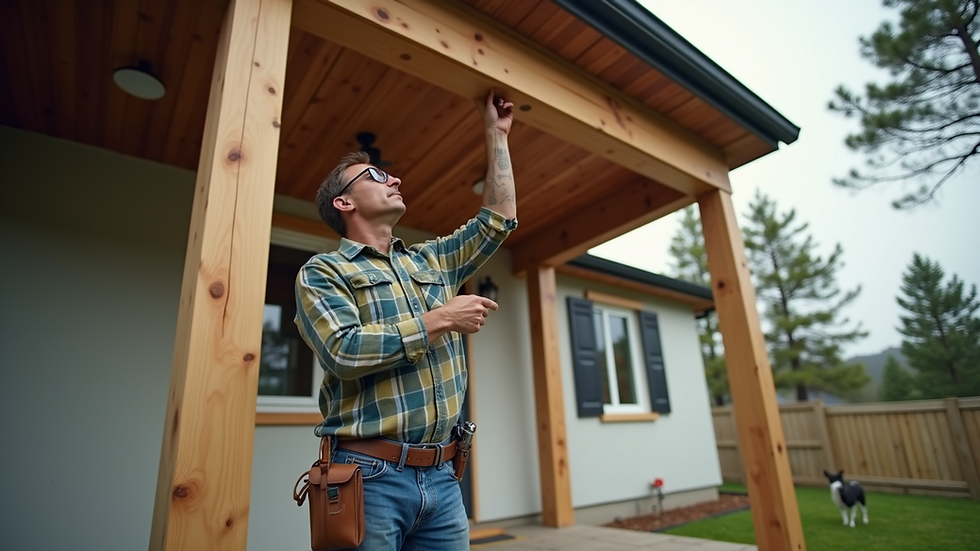Understanding Home Inspection Costs: A Key Investment in Your Property
- anchorandcrownc
- Jul 14, 2025
- 4 min read
Updated: Sep 15, 2025
When buying a home, the inspection process is pivotal. It offers crucial insights into a property's condition before the sale closes. However, many home buyers are often shocked by the costs involved in hiring a home inspector. This post explores the various elements that influence these expenses and highlights why investing in a home inspection is worthwhile.
The Basics of Home Inspections
Home inspections are thorough evaluations designed to assess a property’s overall condition. They typically cover essential systems such as electrical wiring, plumbing, HVAC, and the structural integrity of the home. For perspective, a recent survey found that nearly 85% of buyers consider a home inspection to be an important step in the purchasing process.
Cost Ranges
The cost of inspections generally ranges from $300 to $1,000. This amount varies significantly based on factors like the property's size, location, and inspection complexity. Understanding these variances can help buyers make informed decisions.
Factors Influencing Home Inspection Costs
1. Complexity of the Property
The complexity of a property directly impacts inspection costs. A multi-level home with intricate electrical and plumbing systems requires more time and expertise than a smaller, single-story house. Historical homes or those built with unusual materials may need specialized skills.
For example, inspecting a complex Victorian-style home could cost up to 30% more than a straightforward ranch-style house due to the additional expertise required.
2. Geographic Location
Location is another critical factor affecting home inspection costs. In competitive real estate markets like New York City or San Francisco, demand for inspectors drives up fees. A 2022 report noted that average inspection costs in large urban areas could be 20% higher than in rural settings.
Conversely, homes in less populated areas may see lower costs due to reduced demand and simpler inspections.
3. Inspector Qualifications
The qualifications and experience of the inspector also influence pricing. Inspectors with additional certifications or extensive experience often charge more. For instance, a certified inspector specializing in mold assessment may charge up to 25% more than a standard inspector, reflecting their advanced training.
This expertise can help identify serious issues early, potentially saving buyers thousands in future repairs.
4. Additional Services Offered
Many inspectors offer supplementary services, such as radon testing, pest inspections, or energy audits. While these services can add to inspection costs, they can be crucial, especially in areas with known issues.
For example, radon gas is found in about 1 in 15 homes in the U.S., so an extra $150 for radon testing can be a smart investment. Buyers should evaluate these offerings based on their local concerns and property conditions.

5. Time Investment
A comprehensive inspection often takes two to four hours, depending on property size and complexity. This duration includes the physical inspection and time spent preparing a detailed report.
For example, a 3,000-square-foot home could take three hours to inspect thoroughly. This time and effort ensure a thorough evaluation, which justifies the overall costs.
The Value of a Home Inspection
With the costs in mind, many buyers may question whether home inspections are truly worth it. The answer is a resounding yes!
Investing in a home inspection can prevent costly repairs down the line. A thorough inspection might identify major problems—like a leaking roof or outdated electrical systems—that might not be apparent during a casual visit.
For instance, a roof replacement can cost anywhere from $5,000 to $15,000, making early identification of issues a financial lifesaver.
Peace of Mind
Moreover, securing a home inspection provides buyers with peace of mind. A clear understanding of a property's condition supports informed decision-making and helps plan for any necessary repairs.
According to a National Association of Realtors study, 87% of buyers found a home inspection to be valuable. This statistic shows how inspections can enhance confidence in their investment.
Additional Considerations
Home Buyer Perspective
For many home buyers, the inspection process is more than just a formality. It represents an opportunity to ensure their investment is sound.
Understanding the potential issues with a property can lead to better negotiation during the purchasing process. Buyers can leverage findings from an inspection to request repairs or even renegotiate the price.
Real Estate Agent Insight
Real estate agents often stress the importance of home inspections to their clients. They understand that a well-documented inspection can simplify the buying process.
By addressing potential issues upfront, buyers can move forward with confidence, knowing they have a clear picture of what to expect.
Final Thoughts
While the cost of a home inspection can initially seem daunting, the reasons behind these fees highlight their importance. Factors such as property complexity, geographic location, inspector qualifications, additional services, and time investment justify the expense when considering the benefits.
Home buyers, agents, and sellers should regard home inspections as vital to the buying process. They shield buyers from unexpected surprises and help facilitate smoother transactions.
Recognizing why home inspections incur high costs can offer clarity and affirmation for this crucial service. Ultimately, you can transform a daunting process into a secure investment for your future home.




Comments